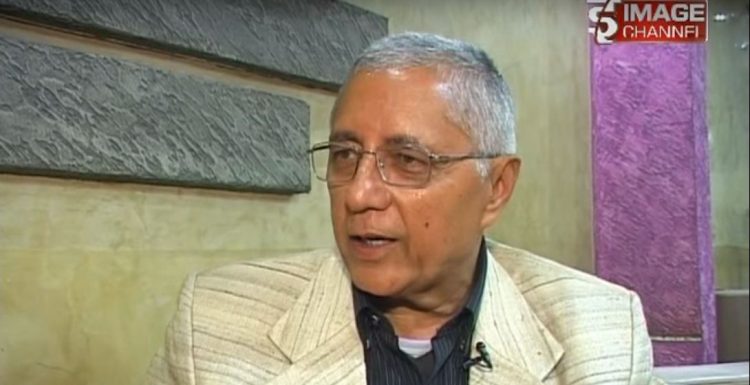Shekhar Koirala was not alone opposing Lokman appointment
Mohan Mainali / November 11, 2016

Nepali Congress leader Dr Shekhar Koirala Photo: Youtube.com/Imagekhabar
Nepali Congress central committee member Dr Shekhar Koirala in an article published in Annapurna Post on November 7 made the following statement:
“Where were those radicals who are now shouting hoarse for Lokman [Singh Karki] impeachment when he was being appointed? When Lokman was appointed, I was the only person who said that he should not be made CIAA chief under any circumstances. Both in the Nepali Congress and Nepali politics, I was the only person opposing Lokman. I pleaded with the leaders of my own party that appointing someone who has lost legal and practical standing in a prestigious post like the chief of the CIAA [Commission for the Investigation of Abuse of Authority] will cast a shadow over the thrust and spirit of the constitution, but they did not listen.”
In order to verify Koirala’s claim, South Asia Check studied a few reports published in Kantipur daily before and after Karki’s appointment.
As Koirala has claimed that he was the only politician opposing the appointment, we do not discuss opposition to the appointment from sectors other than politics.
Around the last week of Falgun 2069 [first week of March 2013], the major political parties had reached an agreement to form a government under the then chief justice Khil Raj Regmi to oversee constituent assembly elections. As per the agreement, Regmi was appointed chairman of the council of ministers on March 14, 2013.
Two days after Regmi’s appointment, the high-level political committee comprising four major parties — UCPN (Maoist), Nepali Congress, CPN-UML and the United Democratic Madhesi Front — asked Regmi to appoint Karki to the post of CIAA chief.
The next day, UCPN (Maoist) Vice-chairman Narayan Kaji Shrestha protested against the committee’s decision to appoint Karki as CIAA chief.
A number of leaders from the Nepali Congress also opposed the committee’s decision. Nepali Congress central committee member Arjun Narsingh KC protested against the committee’s decision stating that there was no point in making appointments other than in the Election Commission and the vacant Supreme Court justice positions.
Some Nepali Congress leaders who were unhappy with the decision to recommend Karki for CIAA chief held a separate meeting to protest the decision. Leaders including Gopalman Shrestha, Sujata Koirala, Shekhar Koirala, Gagan Thapa and Dhanraj Gurung were present at the meeting.
Also, CPN-UML leaders including Yuvaraj Gyawali had protested the committee’s decision.
The next day, Nepali Congress leaders including Shekhar Koirala, Purna Bahadur Khadka, Gopalman Shrestha, Bal Bahadur KC, Chandra Bhandari and Gagan Thapa among others met Nepali Congress President Sushil Koirala and asked him not to appoint Karki as CIAA chief. According to reports, party president Koirala preferred to remain silent on the issue.
A few days after this, the politburo of the CPN-UML decided against the committee’s decision to recommend Karki for CIAA chief. Also, an alliance of 33 small political parties criticized the recommendation.
Following the decision of his party’s politburo, CPN-UML Chairman Jhalanath Khanal said that Karki should under no circumstances be appointed as CIAA chief.
Khanal was also in the high-level political committee, which had recommended Karki for the post of CIAA chief. Defending himself, Khanal had said, “As it was a proposal brought by the three parties, I agreed just for the sake of agreement.”
A day after making the statement, Khanal said that the issue should be left alone.
Kantipur daily reported that CPN-UML leader Madhav Nepal refused to comment on the issue.
Another leader of the CPN-UML, KP Oli, said that he would not go after anyone in a personal way.
Meanwhile, a meeting of the Constitutional Council recommended the president [Ram Baran Yadav] to appoint Karki as CIAA chief. A few hours before the council’s meeting, NC President Sushil Koirala had said that he would make sure that Karki would not be appointed to the post of CIAA chief.
After Karki’s appointment, Shekhar Koirala criticized the decision. CPN-UML’s Shankar Pokharel and Pradeep Gyawali, and Dinanath Sharma of the UCPN (Maoist) joined voices against Karki.
The next day, the CPN-UML presented a memorandum to the president requesting him not to uphold Karki’s appointment. Those in the team that submitted memorandum to the president included CPN-UML General Secretary Shankar Pokharel and leaders Amrit Bohara, Subas Nembang, Yuvaraj Gyawali, Astalaxmi Shakya, Mukunda Neupane, Bishnu Rimal, Pradeep Gyawali, Ghanashyam Bhushal, Binda Pandey, Agni Kharel and Bhanubhakta Dhakal among others.
On May 7, 2014, Nepali Congress President Sushil Koirala called for rectification of the recommendation of the Constitutional Council. CPN-UML’s Madhav Nepal said the council should withdraw its recommendation to the president to appoint Karki as CIAA chief.
But on May 8, Karki was appointed to the post. CPN-UML objected but other major parties remained silent.
On the basis of this information, it can be said that Shekhar Koirala was right to claim that he protested against Karki’s appointment. But his claim that he was the only person both in the Nepali Congress and Nepali politics opposing Lokman when he was being appointed to CIAA chief is incorrect.
This material is copyrighted but may be used for any purpose by giving due credit to southasiacheck.org.
Comments
Latest Stories
- In Public Interest Covid-19 cases are low, but that’s not an excuse to avoid vaccination
- In Public Interest What is BF.7, the sub-variant that has the world by its grip?
- In Public Interest Threat of a new Covid-19 wave looms large amid vaccine shortage in Nepal
- In Public Interest As cases decline, Covid-19 test centres in Kathmandu are desolate lot
- In Public Interest Dengue test fee disparity has patients wondering if they’re being cheated
- In Public Interest As dengue rages on, confusion galore about what it is and what its symptoms are. Here’s what you need to know
In Public Interest
 Covid-19 cases are low, but that’s not an excuse to avoid vaccination
The Pfizer-BioNTech bivalent vaccines authorised by the Nepal Government provide better protection a...
Read More
Covid-19 cases are low, but that’s not an excuse to avoid vaccination
The Pfizer-BioNTech bivalent vaccines authorised by the Nepal Government provide better protection a...
Read More
- What is BF.7, the sub-variant that has the world by its grip?
- Threat of a new Covid-19 wave looms large amid vaccine shortage in Nepal
- As cases decline, Covid-19 test centres in Kathmandu are desolate lot
- Dengue test fee disparity has patients wondering if they’re being cheated
- As dengue rages on, confusion galore about what it is and what its symptoms are. Here’s what you need to know